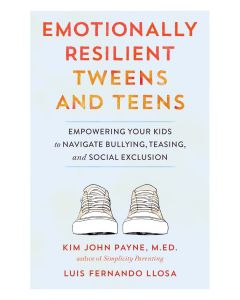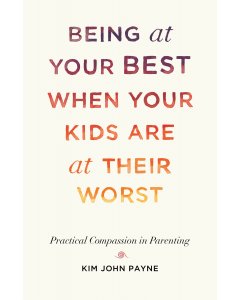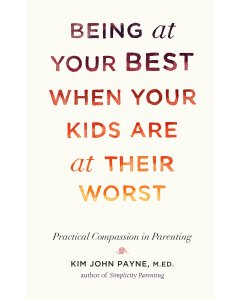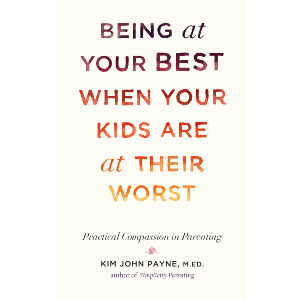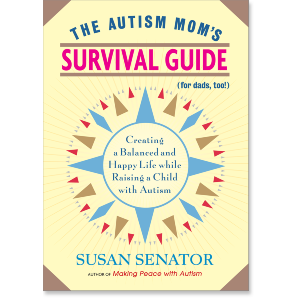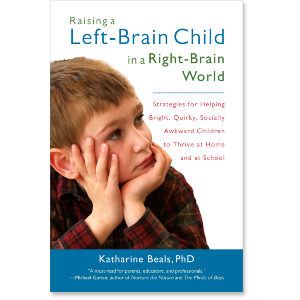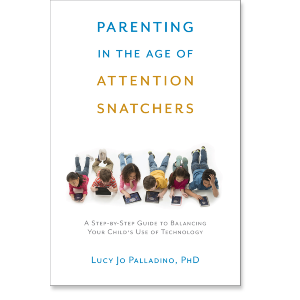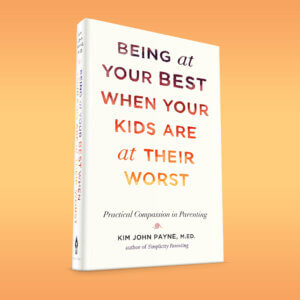

Kim John Payne
Kim John Payne, M.ED., has been a counselor, educator, consultant, and researcher for over thirty years and is the author of several acclaimed books, including Simplicity Parenting, The Soul of Discipline, and Being at Your Best When Your Kids Are at Their Worst.
Kim John Payne
GUIDES
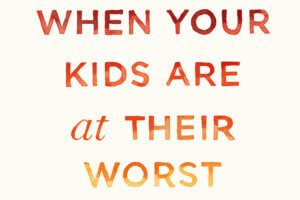
What Gets in the Way of Being at Our Best?
Excerpt from Being at Your Best When Your Kids Are at Their Worst
We all know it’s a mistake to personalize a child’s bad behavior. But in the heat of the moment, we often make difficult interactions with our children all about us. A mother whose nine-year-old daughter was engaging in lots of outbursts and arguments confided, “I get so hurt by the things she says and the accusations she makes!” She described how unfairly she was being treated by her daughter, who seemed “to know just how to press my buttons, particular about things I am sensitive to.” The woman recounted the guilt she felt about her divorce and how much she worried about being a single parent. “When my daughter says she hates me and tells me that all of her friends’ moms are soo much nicer, it hits me where I’m most vulnerable, because I have to work long hours and I know that makes me grumpy.”
This defensive mind-set is much more common than you would think. There are some things to understand about this kind of situation. First, making a difficult interaction with a child about you is never helpful. Of course, we all know this in the rational part of our brains, but it still happens so very often. Personalizing can lead you into a relational maze: it’s easy to get lost in the twists and turns of an argument, end up wondering how this all happened, and, worst of all, find yourself standing there on your own, unable to make your way out.
Parents have told me countless times that they feel they are engaged in a battle of wills with their kids. One dad said to me that he was personally “under siege” and that he needed to defend himself from his child’s behavior. I once jokingly asked a group of parents if they thought their children planned their difficult behavior. To my surprise, a good number felt their kids did. You may think yours do, too, because they are so good at triggering you, but I can assure you their behavior is decidedly subconscious, not Machiavellian. Your child, tween, or teen simply does not wake up in the morning, consider a list of things that will upset you, choose the most effective, and lie in wait for the best moment to inflict maximum hurt.
It’s Not about the Truth—It’s about Power
I explained to the single mom mentioned above—who felt so vulnerable to her daughter’s criticism—that what matters most is not whether her daughter’s words are true or hurtful, but the intensity of her own reaction and response.
I asked her if she thought other kids say these kinds of things to their parents. She was pretty sure they did. Did she think, I asked, that every parent reacts the way she did? She described an exchange she had recently witnessed when she picked up her younger son from a playdate. Her son’s friend was unhappy that the visit was over and angrily exclaimed to his father, “You always make me stop playing!” Rather than react outwardly and respond irritably, the dad replied, in an upbeat tone, “You had a great time with Aaron, and now his mom is here to take him home.” The little boy looked sullen but said nothing more and was soon waving good-bye to his friend as they drove away. We agreed that what the little boy said to his dad was likely to be true. But it was clear that because the father did not react to his son’s jab and defend himself, his son calmed down and quickly moved on.
If child-parent arguments were about harsh-but-true comments, every parent would get upset quite often. But clearly this is not the case. The flustered mom asked me, “If the conflict isn’t about the horrible things being said that make me feel guilty, what is it about?” “It’s not about whether you are the nicest or meanest parent,” I replied, “or whether—at that particular moment—you are loved or hated. It’s about how you react and what your verbal or emotional response triggers in your child.”
This mom’s anger and her perceptible need to protect herself was not only inflaming her interactions with her daughter, it was also doing something far more worrisome—giving her child power over her. Here we have a basic human dynamic: when we feel forced to justify our actions, we are diminished. The aggressor becomes larger, and the receiver shrinks.
For example, who holds the most power in a courtroom—the person on the witness stand defending herself or the prosecuting attorney? The quickest way to put ourselves in the family court witness box is to get caught up in defending ourselves against our kids’ sharp words. The most important thing to understand is that our troubles begin when we take things personally.
The Leadership Vacuum
If a frustrated child or teen lobs a mean comment at you and senses that you respond defensively, she will perceive a tilt in the balance of power. This does not happen on a conscious level. But she senses that you are off-center, not standing on solid ground. And, as strange as it may sound, your perceived imbalance triggers a moment of panic in your child. Basically, the boundaries she was pushing up against in you have given way. That lack of stability causes her to feel emotionally unsupported. She’s leaned on a wall she depends on, and instead of supporting her weight, it has crumbled. She feels like she’s falling, suddenly unsafe and disoriented because the person she counts on to be firm—to be in charge—has stepped back and even abdicated this leadership role. The child then forcefully and somewhat desperately tries to step into and occupy what she experiences as a leadership vacuum. It’s crucial to understand that she does this not to rebel but in order to feel secure again.
Getting Pinged
When kids “try it out,” what are they really doing? In The Soul of Discipline I wrote that “I have never met a willfully disobedient child, only disoriented ones.” Kids send out waves of negative behavior because they feel emotionally lost. It’s one of the most unsettling states a person can experience. Whom do they push up against? Us. Their parents! It’s as if they are using a behavioral echolocation system that bounces waves of challenging actions or words off of us in order to elicit reactions. This helps them get a read on what they are feeling and reorient themselves. Navigators at sea call this “pinging,” and there is not a parent alive who hasn’t been thoroughly pinged.
The silver lining is that they do this to us because we are the people they trust the most. Our kids’ difficult behavior is a form of communication. What’s up to us is how carefully we listen and how sensitively we calibrate our reactions.
When Do We Get Pinged?
Kids ping us when they are feeling emotionally lost. It can happen when things aren’t going well socially with friends and they feel like they are being overlooked. For example, if a new kid at school forms a strong, exclusive bond with a longtime friend whom your child relied on, your son is likely to feel sad, lost, and disoriented. He may well act out and ping you. But it’s not because he wants to make life difficult for you; rather, it’s because he feels the social ground shifting under his feet and is seeking firm ground to stand on.
A mom once asked me if pinging can take the form of withdrawal rather than challenging behavior. The answer is a definite yes. In such a case her child is not acting out, he’s sinking in. Or, to put it another way, her child is falling back rather than pushing back. In both situations children need our help to find their way to being themselves.
Here are a few other reasons a child may feel lost and ping us:
- She feels misunderstood at school, not just by other kids but by the teachers and administration.
- He is overwhelmed by the amount of homework, after-school activities, and sports.
- She feels at sea without a key teacher, mentor, or advisor to help her navigate her demanding days.
- He is unable to understand what he is supposed to learn in his lessons and fears that he is failing.
Kids also act out and need to reorient themselves when big family changes are afoot, such as:
- Moving to another house
- The death of a dear family member or a beloved pet
- Financial pressures affecting the family
- Serious illness in the family
But what’s most difficult for parents to pick up on is when a child pings them because he or she is undergoing developmental changes. The classic view is that physical, cognitive, and social changes occur at the ages of two, six, nine, and fourteen, and this is true for many. However, life is too rich and complicated for this pattern to be set in stone. Changes can occur at different ages for different kids.
When my daughter was fourteen, her gentle bubbliness, which we had come to love, gave way to sharp, sarcastic comments that could rattle our family interactions. At first we were puzzled and offended. But when my wife and I realized she was going through developmental changes, we were able to say things like, “I know it is hard for you right now, but that was harsh.” This softened her a bit, and when she would later join us to “hang out,” her presence signaled to us that she felt safe and understood.
So many parenting techniques get labeled “game changer.” But such an expression cheapens what is in fact a lifelong journey, not a game. If we can truly and profoundly absorb and understand the fact that children are most often disoriented rather than willfully disobedient, we can stand on more insightful, compassionate ground and interact with them from our best selves.
A Being at Your Best Tool: Be Inquisitive Rather Than Accusative
Years ago, when I first arrived in New York City, I’d hear people greet each other with the expressions like “What’s up?” Or, to be more accurate, “Wazzup?” The response would range from a “Nutin’ much” to a “Juz chillin’” or “Workin’ hard.” I was struck by how friendly and inquisitive such a simple greeting could be.
When our children are disoriented, we should create a brief pause by inwardly asking ourselves questions like “I wonder why you said that?” “What’s up? Why are you so upset?” and “Am I missing something here?” A heartbeat or two can be enough to shift the trajectory of your response from reactive annoyance and mounting anger to curiosity about what might be happening to make your kid do what she did. The saying “Don’t just stand there, do something” does not apply here. When you pause and contemplate your disoriented child’s situation—however briefly—before for you act, your response will be much more healthy and well regulated. My advice: don’t just do something, be there.
A Being at Your Best Tool: It’s Not about Magical Answers
What I love about this approach is its simplicity. When you pause to ask the kinds of questions I outlined above, no answer is needed. Just the fact that you reached out to your distressed child with a question in your heart can be enough to displace and even dissolve any judgment and antipathy that might have been developing inside you. That is what matters, not a passing moment of parental brilliance (although this too is allowed).
A Being at Your Best Tool: Softening Can Shift Everything
Our ability to read body language has evolved over thousands of years, and children are especially good at it because their speech is still developing and they rely more heavily on the subtle signals conveyed by our postures and facial expressions. Identify moments when you are clenching your body in a confrontation. If you unclench and reach out to a defiant or distraught child with genuine inquisitive concern, your eyes soften and your posture rounds off. This in turn causes them to unclench, and a tense situation can begin to diffuse.
A Being at Your Best Tool: Your Child or Teen Will Notice
When children and teens are their most angry selves, they are also at their most vulnerable. In such moments they are hypersensitive to any shift in the emotional current flowing between them and their parents. If we harden our facial expression, narrow our eyes, drop our forehead, or draw ourselves up, growing perceptibly larger, harder, and sharper, our children will retreat more deeply into fight, flight, freeze, or flock survival modes. However, if they pick up on an almost imperceptible softening of the eyes, relaxing of the shoulders, or unclenching of the hands, their nervous system can stand down. When I am able to do this with my own kids, I feel like an ancient, deeply rooted oak tree under which they can shade themselves from the withering heat of their intense emotions.
Acknowledging and understanding that our children are dis-oriented rather than disobedient when they act out helps us embrace a more accepting attitude. Our response can then tilt toward kindness and understanding at the very moment when our child needs our acceptance the most.
Share
Related Books

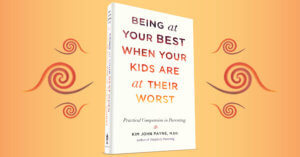
Being at Your Best When Your Kids Are at Their Worst
Practical Compassion in Parenting
ENTER YOUR EMAIL TO RECEIVE "THE FOURFOLD YOU" EXERCISE AS A PRINTABLE PDF FILE.
Find support in your journey toward compassionate parenting with an exercise from Being at Your Best When Your Kids Are at Their Worst!
The path of parenting is littered with challenges. Turmoil, anger, and frustration vie for the spotlight, leading to harmful behavioral patterns and communication methods, jeopardizing your journey of compassionate parenting.
Being at Your Best When Your Kids Are at Their Worst offers techniques that simply and directly shift these damaging patterns in communication and parental behavior. It lifts you out of old, unwanted patterns of action-reaction and prepares you so that the voice you speak with is closer to the parent you want to be.
Download the “Fourfold You Exercise” from the book to learn techniques to better connect with and understand yourself in times of harmony and turmoil, so you can foster a stronger relationship with your kids one challenge at a time.

